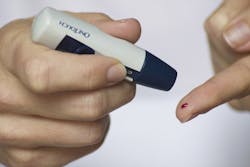A nationwide study funded by the National Institutes of Health (NIH) will seek to discover the cause of several unusual forms of diabetes, according to a press release. For years, doctors and researchers have been stymied by cases of diabetes that differ from known types. Through research efforts at 20 U.S. research institutions, the study aims to discover new forms of diabetes, understand what makes them different, and identify their causes.
The Rare and Atypical Diabetes Network, or RADIANT, plans to screen about 2,000 people with unknown or atypical forms of diabetes that do not fit the common features of type 1 and type 2 diabetes.
A person with atypical diabetes may be diagnosed and treated for type 1 or type 2 diabetes, but not have a history or signs consistent with their diagnosis. For example, they may be diagnosed and treated for type 2 diabetes but may not have any of the typical risk factors for this diagnosis, such as being overweight, having a family history of diabetes, or being diagnosed as an adult. Alternately, a person with atypical diabetes may respond differently than expected to the standard diabetes treatments.
“It’s extremely frustrating for people with atypical diabetes when their diabetes seems so different and difficult to manage,” said the study’s project scientist, Christine Lee, MD, MS, of the NIH’s National Institute of Diabetes and Digestive and Kidney Diseases (NIDDK). “Through RADIANT, we want to help patients and the broader healthcare community by finding and studying new types of diabetes to shed light on how and why diabetes can vary so greatly.”
RADIANT researchers will build a comprehensive resource of genetic, clinical, and descriptive data on previously unidentified forms of diabetes for the scientific and healthcare communities. The study’s researchers will collect detailed health information using questionnaires, physical exams, genetic sequencing, blood samples, and other tests. People found to have unknown forms of diabetes may receive additional testing. Some participant family members may also be invited to take part in the study.

